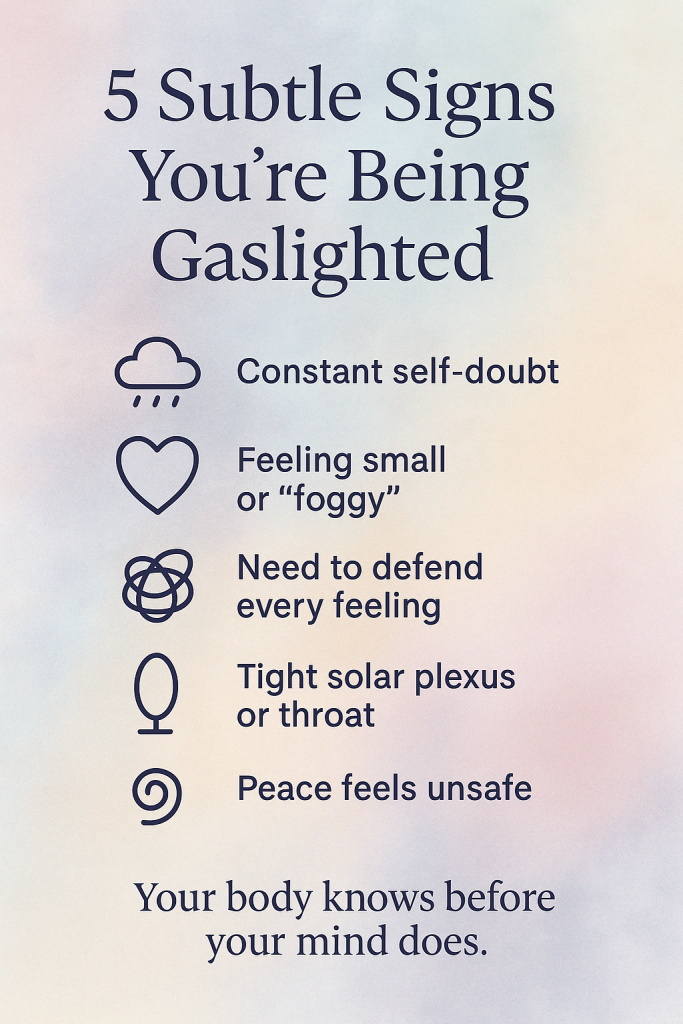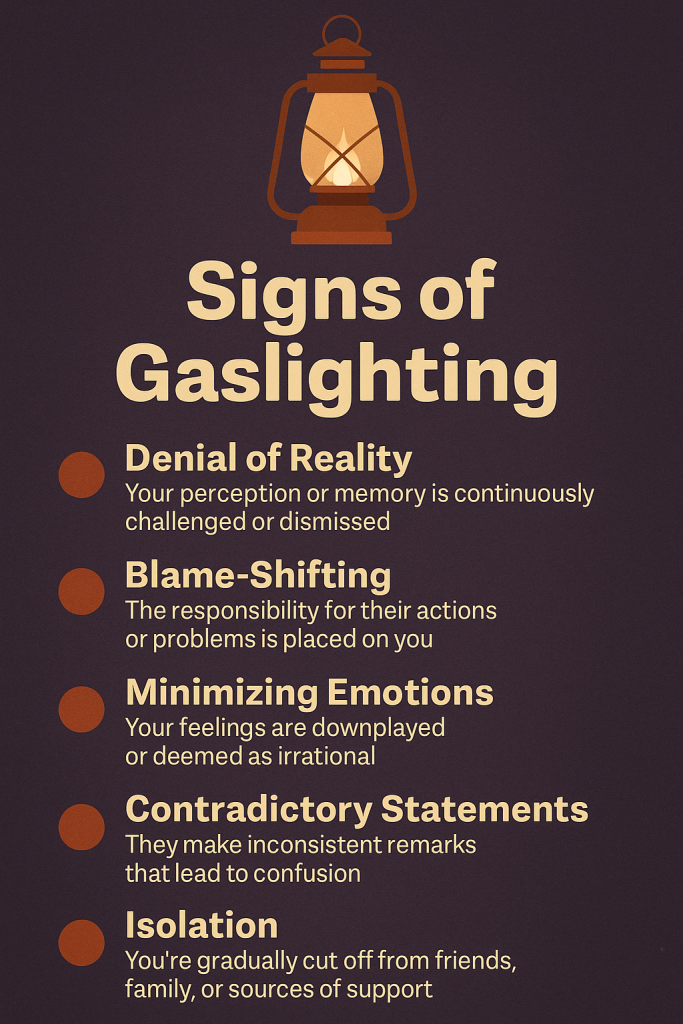Gaslighting is more than a mind game—it’s an energetic invasion. It happens when someone repeatedly makes you question your own perception, reality, and memory until you start doubting your intuition. But here’s the twist: when viewed through a psychic lens, gaslighting isn’t just emotional manipulation—it’s vibrational distortion.
Most online advice about gaslighting focuses on spotting warning signs, but few talk about what happens to your energy field when it occurs. A psychic would tell you that gaslighting dulls your inner light, compresses your aura, and scrambles your intuitive signals. It’s not just confusing—it’s energetically draining.
This article dives deep into gaslighting from a spiritual and psychic perspective. You’ll learn how it disrupts intuition, how to recognize its subtle energetic effects, and how to reclaim your inner truth using psychic healing tools. Along the way, we’ll explore stories of real intuitive breakthroughs and practical exercises to restore clarity, confidence, and power.
As Psychology Today explains, gaslighting is a manipulation tactic used to make someone question reality. But psychics see it as something even more profound: an attempt to hijack your frequency. The good news? You can’t permanently disconnect from your intuition—it just needs re-tuning.

The Energetic Anatomy of Gaslighting
To understand how gaslighting affects you, picture your aura as a glowing field that records every emotional experience. When someone repeatedly invalidates your truth, they inject confusion into your energy. Over time, this interference distorts your sense of self and dims your light.
Gaslighting doesn’t start with an insult—it begins with doubt. A partner might say, “You’re overreacting,” or “You’re too sensitive.” In the moment, it seems small. But each dismissal chips away at your self-trust until your intuition starts whispering instead of roaring.
Energetically, gaslighting often targets the solar plexus chakra (the center of personal power) and the throat chakra (the center of truth and expression). Victims often describe tightness in their chest, difficulty speaking up, or exhaustion after conversations.
One client shared that she often left her relationship feeling foggy and apologetic, even when she hadn’t done anything wrong. During a psychic session, the reader saw her aura as “fractured yellow”—a classic sign of suppressed confidence. After energy healing sessions and daily affirmations, that yellow brightened again.
According to Psychology Today’s breakdown, gaslighting works because it manipulates your emotions and memories. From a psychic perspective, it also works because it disconnects you from your inner knowing—the frequency of truth.
When you feel confused, drained, or like you’re walking on eggshells around someone, trust that feeling. That’s your energy signaling danger long before your mind catches up.
The Subtle Signs Your Energy Is Being Twisted
Gaslighting rarely announces itself. It sneaks in through polite dismissals, “harmless jokes,” and tone-policing. But your energy field knows immediately when something is off.
Here are the energetic warning signs psychics often see in gaslighted clients:
Psychic Fatigue – You feel mentally foggy or physically tired after simple conversations.
Aura Shrinkage – Your energy feels smaller, like you’re constantly trying to protect yourself.
Solar Plexus Tightness – A subtle knot in your stomach whenever you’re around the person.
Repetition Loops – You keep defending yourself, but the conversation circles back again and again.
Throat Chakra Blockage – Your words stop mid-sentence or you struggle to articulate feelings.
A woman once told her psychic, “I can’t even tell what’s real anymore.” The psychic gently replied, “Then let’s start with what feels real.” That moment broke the spell. Gaslighting confuses your thoughts, but your body always knows.
The Verywell Mind guide on emotional abuse confirms that manipulation can lead to self-doubt, anxiety, and loss of identity. Psychically, those symptoms appear as energetic fragmentation—your aura scattered into survival mode. Recognizing that fragmentation is the first step to reclaiming your intuition.
How Gaslighters Manipulate Intuition

A skilled manipulator doesn’t just control what you think—they control how you feel about what you think. Gaslighters weaken intuition by creating a feedback loop of doubt. The more you question your perception, the easier it is for them to rewrite your truth.
Psychics often describe gaslighting as “energetic cording”—when someone attaches to your solar plexus or heart chakra to drain power. Over time, this cord keeps you emotionally hooked even when your logic says, “This is wrong.”
Imagine your intuition as a compass. Gaslighters spin it by constantly shifting reality:
They deny facts (“That never happened”)
They mock emotion (“You’re too sensitive”)
They project guilt (“You’re the one overreacting”)
They rewrite history (“You always misunderstand me”)
One psychic shared a story of a client who felt paralyzed after months of such treatment. During a session, the reader visualized a dark cord in the client’s solar plexus linked to her ex-partner’s energy. After guiding her through a cutting visualization, the client reported immediate lightness and clearer thinking.
The Harvard Health blog explains that emotional manipulation triggers the brain’s fear circuits, making it harder to access logic. In psychic terms, that means your intuition goes offline because your energy field is in defense mode.
But the same intuition that can be distorted can also be restored—once you start listening to it again.
5 Psychic Self-Defense Tools Against Gaslighting
Recovering from gaslighting is not just about seeing manipulation—it’s about reclaiming your energy. Psychic protection focuses on restoring your intuition, cleansing emotional residue, and strengthening your energy field so you stop attracting similar patterns. Here are five tools that empower your aura and mindset:
1. Cord-Cutting Visualization
Imagine a silver cord connecting you to the person who manipulates you. Now see golden light surrounding the cord, gently dissolving it while you say, “I release all energy that is not mine.” This technique helps reclaim the energy you gave away in confusion or guilt. Clients often describe feeling physically lighter or suddenly calmer after doing this.
2. Solar Plexus Strengthening
Your solar plexus chakra governs self-trust and confidence. To strengthen it, stand tall, breathe into your belly, and imagine sunlight radiating from your core. Affirm: “I trust my perception. My truth is valid.” This small ritual retrains your energetic center to hold its power again.
3. Affirmation Anchors
Gaslighting thrives on repetition, so fight it with repetition of your own. Post affirmations where you’ll see them daily:
“My emotions are real.”
“My memories matter.”
“Calm truth feels better than forced peace.”
Over time, these phrases replace internalized doubt with inner steadiness.
4. Mirror Work for Self-Validation
Stand before a mirror, look into your eyes, and speak your truth aloud. For example: “I was hurt, and it matters.” Mirror work reprograms the subconscious mind and restores authenticity to your throat chakra—the energetic home of self-expression.
5. Aura Renewal Bath
Add sea salt and a few drops of lavender or rosemary oil to warm water. As you soak, visualize negative energy leaving your body as gray smoke while new light enters. End with gratitude for your intuition’s protection.
One woman who practiced these steps for a week noticed her dreams returning—vivid, clear, and empowering. Her psychic told her that was her intuition reawakening. When your aura clears, your subconscious becomes your ally again.
How Psychics Detect Gaslighting in Relationships
Psychic readers are trained to sense emotional incongruence—the mismatch between what someone says and what their energy reveals. During readings, they often perceive emotional static, sudden heaviness, or cold tones when discussing a manipulative person.
A professional psychic might describe seeing a gray or flickering aura around the gaslighter’s name or feeling a pull in their solar plexus while reading the client’s energy. This energetic discord confirms manipulation long before concrete proof surfaces.
For example, one PsychicOz reader once shared a session where a client described her partner as “protective.” Yet the reader felt her aura constrict whenever she mentioned him. The psychic gently asked if “protective” ever felt like control. The client cried—it had. The reading helped her trust that her body had been warning her all along.
According to the Greater Good Science Center, emotional honesty builds safety and connection. Psychically, that truthfulness feels like warmth and flow. When someone’s energy feels cold or erratic despite loving words, your intuition is reading the real story.
Psychics can also detect cords of emotional dependency—energetic attachments that keep you bound to the gaslighter’s influence. Once those cords are cleared through energy healing, most clients report feeling free, grounded, and mentally sharper.
Turning Gaslighting into a Psychic Awakening
It might sound surprising, but many people discover their deepest intuition only after escaping manipulation. Once you stop living inside someone else’s reality, your inner compass recalibrates. The pain that once silenced you becomes the same pressure that hones your psychic clarity.
One former client said, “After he left, I could feel energy again—my house felt different, my thoughts were my own.” What she described wasn’t coincidence; it was her aura expanding back into authenticity.
From a psychic view, gaslighting acts like a spiritual initiation—it forces your soul to evolve by teaching discernment. You start to feel energy shifts faster, spot dishonesty quicker, and sense alignment sooner. The wound becomes your wisdom.
A woman who once doubted everything began learning Tarot as a healing hobby. Her readings revealed truths she had ignored for years. Today she reads professionally, using her gift to help others see through manipulation. Her story proves that gaslighting doesn’t destroy intuition—it forges it.
The Verywell Mind guide on emotional healing emphasizes rebuilding trust in yourself as the core of recovery. From an energetic standpoint, that means restoring connection to your higher self—the inner guide that never stops whispering the truth.
How to Rebuild Your Intuitive Trust
Once you’ve identified and distanced yourself from gaslighting, the real healing begins. The goal is not just to feel “okay” again, but to fully reconnect to your intuition—the inner GPS that manipulation once blurred. Think of this process as psychic rehabilitation for your energy system.
1. Grounding Meditations
Spend five minutes each morning feeling your feet connect to the earth. Visualize energy rising from the ground to your heart, steady and warm. The earth’s vibration helps recalibrate your aura, reminding your nervous system what safety feels like.
2. The Truth List
Each evening, write three things you know are true from your own experience—no external validation required. Over time, this list retrains your brain and spirit to rely on direct perception rather than outside approval.
3. Dream Journaling
Dreams are your subconscious’ psychic voice. After gaslighting, they often surge with symbols that help your energy heal. Write them down daily and circle repeating images. They often reveal patterns your conscious mind misses.
4. Psychic Validation Sessions
A psychic reading after gaslighting can feel like finally hearing your intuition spoken back to you. Choose a reader known for empathy and ethics. Many clients find that a single intuitive session helps them reclaim confidence in their own perceptions.
5. Reconnecting with Body Intelligence
Your body is your intuition’s amplifier. Stretch, dance, or walk in nature while asking yourself, “What does safety feel like today?” Notice the sensations that arise. When your body feels peaceful, your psychic clarity increases automatically.
A client once described that after leaving a manipulative relationship, she began practicing yoga and grounding meditations. Within months, she said she could literally feel when someone’s words didn’t match their energy. “My intuition feels physical now,” she said. That’s not unusual—it’s your natural psychic alignment returning.
When to Seek Professional or Psychic Guidance
There are times when energetic healing alone isn’t enough. Gaslighting leaves real psychological residue—anxiety, hypervigilance, and self-blame. The combination of therapy and psychic insight often produces the fastest recovery because it addresses both the emotional and spiritual layers of trauma.
Therapists help reframe the cognitive distortions that gaslighters create. Psychics help remove the energetic residue that keeps you emotionally tied. Together, they restore your full spectrum of clarity—mind, body, and spirit.
You should consider seeking help if:
You still second-guess yourself constantly, even with kind people.
You feel drained by memories of the manipulator.
Your body tenses up when recalling certain conversations.
You struggle to make decisions without reassurance.
One PsychicOz reader shared how a client who had spent months in therapy still felt energetically “foggy.” During her session, the psychic sensed a heavy gray cord between the woman’s solar plexus and heart chakra. After a guided cutting and visualization exercise, the client said she felt like she could breathe deeply for the first time in years.
That’s the difference between surviving and clearing—therapy rewires your thoughts, but energy work reclaims your vibration.
Conclusion – You Were Never Crazy, Just Disconnected
Gaslighting tries to convince you that your truth doesn’t matter. But the truth can’t be erased—it can only be buried under fear. Once you lift that fear, your intuition shines again.
You weren’t overreacting. You were reacting to energy your body recognized before your mind understood it. That’s not weakness; that’s sensitivity—a psychic gift in disguise.
Every time you choose to believe your own perception, you rebuild the bridge between your human self and your higher self. And every step toward self-trust strengthens your ability to sense truth in others too.
Remember, your intuition is sacred technology. It is your built-in lie detector, your energetic compass, and your emotional guardian. No one can permanently disconnect you from it. You just have to tune back in.
You are not “too sensitive.” You are finely tuned. And the world needs that sensitivity more than ever.
Frequently Asked Questions
1. What is gaslighting in simple terms?
It’s a pattern of manipulation that makes you question your memory, perception, and sanity.
2. How does gaslighting show up energetically?
You may feel aura shrinkage, solar plexus tension, brain fog, and a persistent urge to self-doubt.
3. What’s a quick body check to spot gaslighting?
Notice a stomach drop, tight chest, or throat constriction when you speak your truth to a specific person.
4. Can gaslighting happen without yelling?
Yes. It often appears as calm denial, selective memory, or “jokes” that invalidate you.
5. What phrases do gaslighters commonly use?
“You’re too sensitive,” “That never happened,” “You always misunderstand me,” “You’re overreacting.”
6. How does a psychic view gaslighting?
As energetic distortion that scrambles intuition and creates dependency cords to your power center.
7. Can I trust my intuition after being gaslighted?
Yes. Intuition rebounds with practice; it was muted, not broken.
8. What’s the first step to reclaim my reality?
Name three truths from your direct experience and breathe into your belly while you say them aloud.
9. How do I set a boundary with a possible gaslighter?
Use calm clarity: “I remember it differently. I won’t argue my reality.”
10. What is cord cutting and why does it help?
It’s a visualization that releases energetic hooks to manipulative dynamics, restoring your personal power.
11. Which chakra is most affected?
The solar plexus (self-trust) and the throat (self-expression).
12. How can journaling help?
It externalizes looping arguments so your intuition can see patterns clearly.
13. What if I still doubt myself afterward?
Doubt is a symptom. Keep affirming, grounding, and tracking what your body felt in real time.
14. How does therapy fit with psychic tools?
Therapy reframes thoughts; psychic tools clear energetic residue. Together they accelerate healing.
15. Are apologies from gaslighters real?
Sometimes, but look for repair behavior over time—changed patterns, not polished words.
16. How can I protect my energy daily?
Ground, visualize a light boundary, and limit circular debates that erode self-trust.
17. What if the gaslighter is family?
Use time limits, neutral locations, written follow-ups, and strong aftercare (salt bath, breathwork).
18. Is ghosting myself from the relationship okay?
If safety or sanity is at risk, distance is protection, not punishment.
19. Can gaslighting occur at work?
Yes—via shifting expectations, blame-shifting, or rewriting history in meetings. Document everything.
20. What’s a green flag after gaslighting?
People who welcome your boundaries, validate your feelings, and repair without defensiveness.
21. How do dreams support recovery?
Dreams surface silenced truths; recording them rebuilds trust in inner guidance.
22. What affirmation anchors self-trust?
“I honor what I feel and remember. My calm truth is valid.”
23. How do I respond to “You’re overreacting”?
“I’m reacting appropriately to how this feels in my body. Let’s address the impact.”
24. What if I can’t find proof?
Your experience matters. Seek patterns, not perfect evidence; consult trusted professionals if needed.
25. How long does healing take?
Shifts can begin in days; deeper rewiring takes weeks to months. Consistency beats intensity.
26. Which crystals support this work?
Tiger’s eye for courage, citrine for solar plexus strength, lapis or blue lace agate for clear speech.
27. What does energetic reciprocity look like?
Conversations that leave you lighter, heard, and not second-guessing yourself.
28. How can friends help?
Believe you, reflect patterns without judgment, and support boundaries you set.
29. When should I book a psychic reading?
When facts feel muddy but your body says “off,” or when repeated doubt clouds decisions.
30. What’s the success signal of recovery?
You default to self-trust, require less reassurance, and calmly exit circular conversations.





An incredibly insightful and comprehensive article on gaslighting. It’s crucial to spread awareness about such manipulative behaviors, as they can have severe impacts on one’s mental health and self-esteem. The breakdown of signs and stages is very helpful for anyone trying to understand their own experiences or those of a loved one. Kudos to the author for addressing this sensitive subject with such clarity and detail.
The article’s emphasis on the need for setting and maintaining boundaries as a defense against gaslighting is well-founded. Personal autonomy and self-awareness are critical in mitigating the effects of emotional abuse. The suggested steps for seeking help provide a clear path forward.
The examples of gaslighting in different contexts, such as with bosses or doctors, highlight the pervasive nature of this manipulative behavior. It’s useful to recognize that gaslighting isn’t confined to personal relationships but can occur in various social dynamics.
The information on the psychological impact of gaslighting, including feelings of anxiety and depression, is crucial. Understanding these symptoms can aid in identifying gaslighting early, which is vital for mental health. The article also underscores the importance of professional support.
The article provides a comprehensive overview of gaslighting, elucidating it as a subtle yet pernicious form of emotional abuse. The historical context, starting from 1938, adds depth to the understanding of its origins. Highlighting the various facets of gaslighting—from personal relationships to professional settings—makes it evident how ubiquitous and damaging this tactic can be. The signs listed are particularly useful for individuals to self-assess their situations. The suggested responses and professional help options offer practical steps for those affected. A well-rounded and informative piece overall.
I appreciate the detailed breakdown of gaslighting behaviors in various relationships, such as familial, romantic, and professional. The section on how to respond to gaslighting is particularly practical, offering actionable advice on setting boundaries and seeking help.
The article provides a comprehensive overview of gaslighting. It effectively outlines both the signs and stages of being gaslit, which can be very helpful for individuals trying to understand their own experiences. The history and examples given also contextualize the seriousness of this form of emotional abuse.